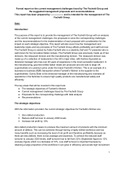Exam (elaborations)
Distinction Example of Unit 6 The Fachetti Group Part B MOCK January 2022 (Report)
- Institution
- PEARSON (PEARSON)
This document includes mock report of The Fachetti Group. This report is distinction level and reaches the fourth band in each Assessment Objective. This includes the challenges, proposals and recommendations and can be used as a guide or help for the actual exam.
[Show more]




